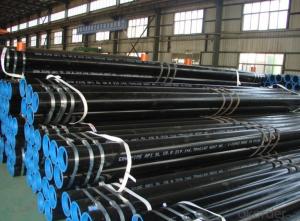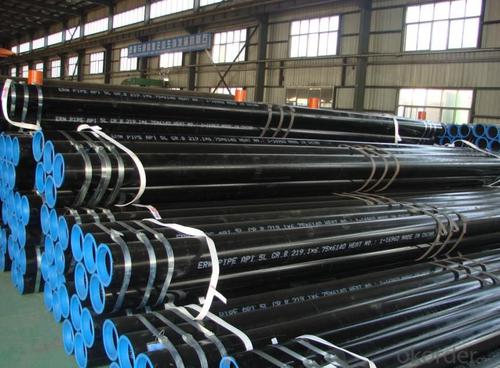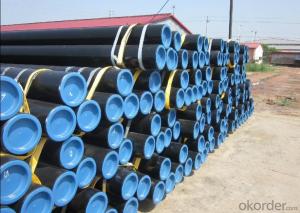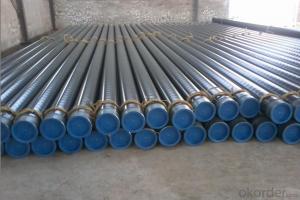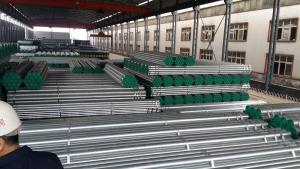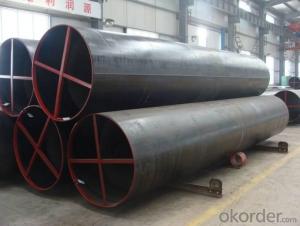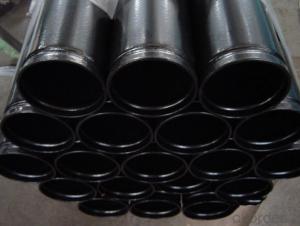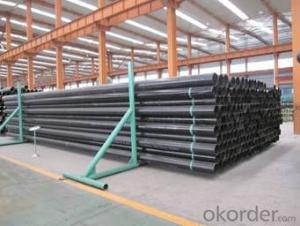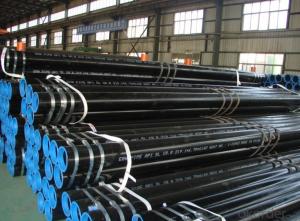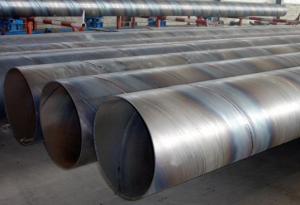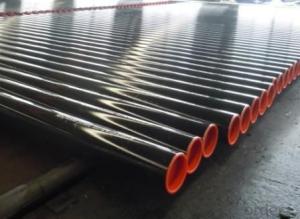ERW STEEL BLACK PIPE
- Loading Port:
- China Main Port
- Payment Terms:
- TT OR LC
- Min Order Qty:
- -
- Supply Capability:
- -
OKorder Service Pledge
OKorder Financial Service
You Might Also Like
1)Outside Diameter: 10.3mm--914.4mm
2)Wall Thickness: 0.5~59.54mm
3)Length: Random 1~12m or fixed 6
4)Material quality: ASTM A106 / A53/A210, API 5L,API 5CT,DIN, EN, GB/T8162 / 8163, etc
5)Packing:Hexangular packing in bundles
6)Export: Europe, North America, the Middle East, Africa, Asia and other countries and regions, well received by consumers!
Product Name: | ERW pipe | |
Size | OD | 1/8” -24” (10.3mm-914.4mm) |
Wall Thickness | 0.5mm-59.54mm SCH30,SCH40,STD,XS,SCH80,SCH,XXS | |
Length | 1m-12m | |
Steel material | Q195,Q215,Q235,Q345,STL400,ST37-2,16Mn,X42,X52,X80,E235, Grade B, SS330,SPHC, S185,SS400,S235JR,ST52,STK500 | |
Standard | BS1387-1985,ASTM A53,ASTM A106,GB/T3091-93-2008,EN10129,JIS. | |
Usage | Used For irrigation,Structure, Accessorize And Construction | |
Ends | 1) Plain 2) Beveled 3) Threaded with Coupling & cap | |
Surface Treatment | 1) Bared 2) Black Painted (varnish coating) 3) Galvanized 4) With Oiled | |
Technique | Electronic Resistance Welded (ERW ) Electronic Fusion Welded (EFW) Double Submerged Arc Welded (DSAW) | |
Welded Line Type | Longitudinal | |
Inspection | With Hydraulic Test, Eddy Current , Infrared Test | |
Package | In Bundle with water-proof package | |
Delivery | 1) Container 2) Bulk carrier | |
Port of Shipment | Xingang Port,Tianjin, China | |
Date of Delivery | 15 days after contract | |
Payment | L/C at sight or 30% T/T | |
Others | Fitting as coupler and flange also can be supplied. | |
- Q: What is the difference between steel pipes and PVC pipes?
- The main difference between steel pipes and PVC pipes lies in their material composition. Steel pipes are made of a durable and strong metal alloy, while PVC pipes are made of a lightweight and flexible plastic called polyvinyl chloride. Steel pipes are typically used for heavy-duty applications that require high strength and resistance to extreme temperatures and pressure, such as in industrial settings or for transporting liquids or gases over long distances. On the other hand, PVC pipes are commonly used for residential and commercial plumbing systems due to their affordability, ease of installation, and resistance to corrosion. Additionally, PVC pipes are not suitable for high-pressure applications and have a lower heat tolerance compared to steel pipes.
- Q: What are the common methods of joining steel pipes?
- The common methods of joining steel pipes include welding, threading, and using mechanical couplings. Welding involves fusing the pipes together using heat, while threading involves screwing the pipes together using threads on the ends. Mechanical couplings are devices that connect the pipes together using compression or other means.
- Q: How are steel pipes insulated to prevent noise transmission?
- Steel pipes are typically insulated to prevent noise transmission by using materials such as fiberglass or mineral wool wraps. These insulating materials are wrapped around the pipes, creating a barrier that absorbs and dampens sound waves, reducing noise transmission. Additionally, acoustic lagging or jackets can also be applied to further reduce noise and vibration.
- Q: What is the difference between internal coating and external lining of steel pipes?
- The main difference between internal coating and external lining of steel pipes lies in their purpose and location. Internal coating refers to the application of protective materials on the inner surface of the steel pipe, primarily to prevent corrosion, improve flow efficiency, and maintain the quality of transported fluids. On the other hand, external lining involves applying protective materials to the outer surface of the steel pipe, mainly for corrosion resistance, insulation, and protection against external elements. Therefore, while internal coating focuses on the interior protection and performance of the pipe, external lining shields the pipe from environmental factors and external damage.
- Q: What are the different types of steel pipe reducers?
- Various industrial applications commonly use different types of steel pipe reducers. These reducers facilitate the connection between pipes of varying sizes, ensuring a smooth transition in fluid or gas flow. The following are some of the most frequently encountered types: 1. Concentric Reducers: These reducers possess a symmetrical design with a centerline that aligns with both the larger and smaller pipes' centerlines. They facilitate a gradual reduction in pipe size, ensuring a seamless material flow. 2. Eccentric Reducers: In contrast to concentric reducers, eccentric reducers have an offset centerline. This design is beneficial in preventing the accumulation of air or gases in the piping system. The eccentric reducer directs any gas or air towards a vent or drain point. 3. Welded Reducers: These reducers are created through the welding of two pipes of different sizes. They are frequently used in situations that require a permanent connection. 4. Seamless Reducers: Seamless reducers are manufactured without any welded joints. They are crafted from a single piece of steel, enhancing their strength and durability. Seamless reducers are often preferred in applications where leak-proof connections are crucial, such as high-pressure or high-temperature environments. 5. Threaded Reducers: These reducers have male and female threads on both ends, allowing for easy installation and removal. They are commonly used in low-pressure applications and are a cost-effective option for systems that require frequent disassembly. 6. Flanged Reducers: Flanged reducers possess flanges on both ends, which are bolted together to create a secure seal. They are frequently used in piping systems that require convenient access for maintenance or inspection. Each type of steel pipe reducer offers its own unique advantages and is selected based on the specific requirements of the application. Factors such as the transported fluid or gas type, pressure and temperature conditions, and the need for easy installation or maintenance should be considered when choosing the appropriate reducer for a particular system.
- Q: Can steel pipes be used for conveying oil?
- Yes, steel pipes are commonly used for conveying oil due to their durability, strength, and resistance to corrosion. They are able to withstand high pressure and temperature conditions, making them ideal for transporting oil over long distances.
- Q: Steel pipe is particularly long, how to clean the inner wall of the pipe so that it can be thoroughly cleaned
- High cleanliness requirements for ultrasonic cleaningUltrasonic cleaning principle: the pressure change of ultrasonic wave propagation in the liquid in the liquid cavitation phenomenon strongly, per second produced millions of tiny gas bubbles, these bubbles rapidly in large pressure under the action of not following the violent explosion, impact force and produce strong suction, enough to make the stubborn dirt quickly stripped.
- Q: What are the different types of steel pipe supports for seismic applications?
- There are several types of steel pipe supports used for seismic applications, including rigid supports, sway braces, and spring hangers. Rigid supports provide fixed support to the piping system, while sway braces are designed to absorb and redirect seismic energy. Spring hangers, on the other hand, are used to isolate and dampen vibrations caused by seismic activity. These different types of supports are selected based on the specific requirements and characteristics of the piping system and the seismic zone in which it is located.
- Q: Can steel pipes be used for drainage systems?
- Yes, steel pipes can be used for drainage systems. Steel pipes are durable, strong, and resistant to corrosion, making them suitable for various applications, including drainage systems. They can effectively transport water and waste materials, ensuring efficient drainage.
- Q: Can steel pipes be used for air conditioning systems?
- Yes, steel pipes can be used for air conditioning systems. Steel pipes are commonly used in HVAC (Heating, Ventilation, and Air Conditioning) systems as they are durable, can withstand high pressures, and are resistant to corrosion.
Send your message to us
ERW STEEL BLACK PIPE
- Loading Port:
- China Main Port
- Payment Terms:
- TT OR LC
- Min Order Qty:
- -
- Supply Capability:
- -
OKorder Service Pledge
OKorder Financial Service
Similar products
Hot products
Hot Searches
Related keywords
